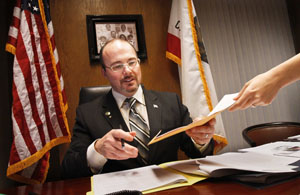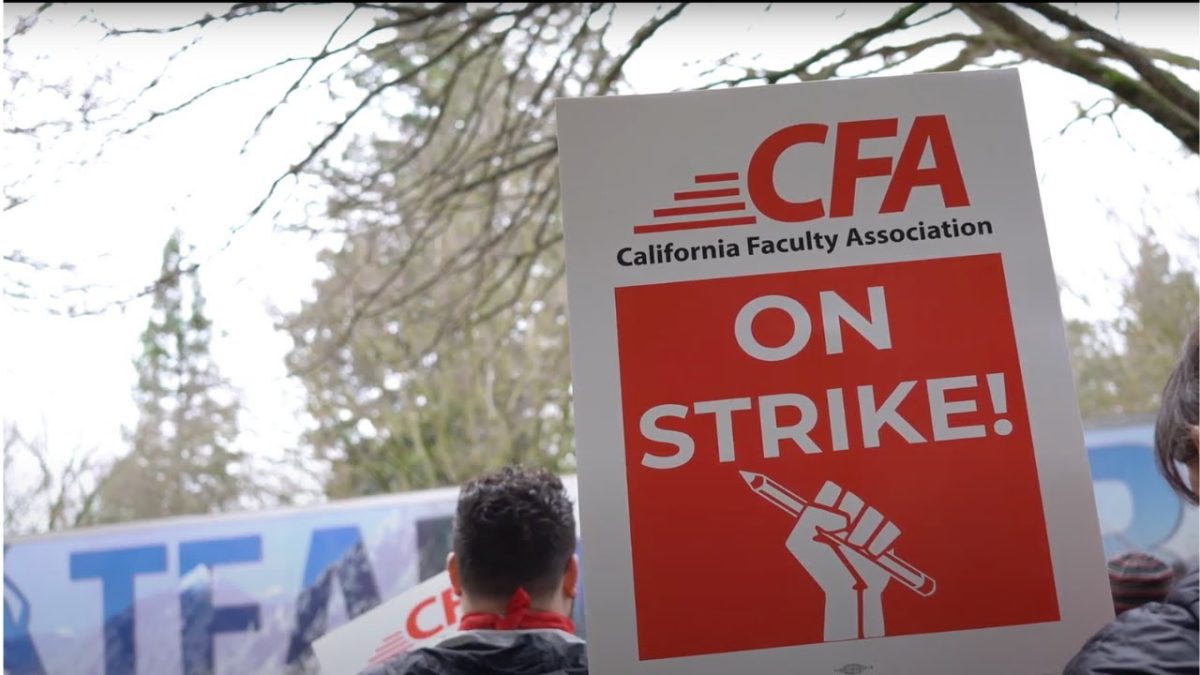Immigration laws lead to racism

California Assemblyman Tim Donnelly, the only member of the Tea Party in the Assembly, works in his office in Sacramento, California, on February 23, 2011. (Anne Cusack/Los Angeles Times/MCT)
April 20, 2011
There are millions of illegal immigrants in California.
According to the U.S. Department of Homeland Security, Office of Immigration Statistic there was an estimated 2.6 million illegal immigrants residing in California in 2009. In total, illegal immigrants represent about 6.8 percent of the state’s population.
So, it is no wonder Assembly Bill 26, proposed by State Assemblyman Tim Donnelly, R-Twin Peaks, died in committee this month. In fact, it was probably never really alive.
The bill, similar to that of Arizona’s controversial SB 1070, would have required employers to use the federal E-Verify program to confirm the legal work status of all employees, imposing sanctions on employers who knowingly or intentionally hire undocumented workers.
“Sanctuary cities,” like San Francisco and Los Angeles would have also been barred under the legislation, allowing any citizen to sue his or her local government for operating as a sanctuary city for illegal immigrants.
AB 26 would have made it a misdemeanor trespass for any illegal immigrant to be on public or private land, reinforcing federal immigration laws which already make it a crime to be in the United States illegally.
The hot-button issue of immigration almost always leads to the same place: racism.
It is virtually impossible to be in favor of enforcing current immigration laws without being labeled a racist. People simply assume that if you are against illegal immigration you must be against immigrants in general.
Katherine Sheldon, junior psychology major, agrees with that position.
“It’s subconscious racism,” Sheldon said. “There’s an underlying tone of racism in propositions like that and the people who support them.”
Bills like AB 26 and Arizona’s SB 1070 are designed to uphold and enforce federal laws that are already on the books. They are not, as some might assume, simply the political desire of the right wing to stop immigrants to come into the country.
It is not racist to require people to come into the U.S. through legal means.
The United States was built on the backs of immigrants and it has always been a place that welcomes people from around the world. Immigration has created a rich and diverse society and has made our country one of the most desired places to live on the planet.
However, we are also a nation of laws. It is just like a parent who makes rules for his or her children but then allows them to be broken. If we continue to allow people to come into the country illegally, we might as well throw out the laws and open the borders.
But, as Donnelly found out, being in favor of enforcing federal immigration laws is not popular in California.
Ryan Nowshiravan, freshman biology major, likes the idea of sanctuary cities and does not believe employers should be prosecuted for hiring illegal immigrants in California, even if it is against federal law.
“Everybody deserves a chance,” Nowshiravan said. “There should be some kind of requirement that they should be working, but that means employers have to hire them.”
However, hiring undocumented workers perpetuates the cycle of illegal immigration. It creates an incentive for people to go around legal means of getting a work visa or applying for citizenship. It pushes employers into the dirty business of choosing low-wage undocumented workers over higher-paid legal employees.
Immigration will be an issue to deal with for many years to come. There are many sides with valid points to consider. But we must have open discussion about it without allowing emotion to devolve the conversation into simple name-calling and ad hominem attacks. Disagreement does not equal racism.
Kelly Walters can be reached at [email protected].









































































































































